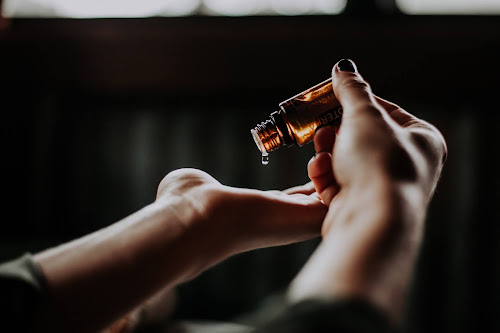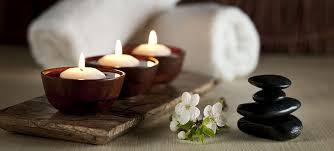Essential Oils: Sandalwood Edition
In both Ayurvedic and traditional Chinese medicine, sandalwood oil is believed to be beneficial in treating both physical and mental disorders, including anxiety, bronchitis, diarrhea, fatigue, fever, gallbladder problems, high blood pressure, indigestion, insomnia, liver problems, low libido, sore throat, and urinary tract infections.
In aromatherapy, inhaling the aroma of sandalwood oil or absorbing it through the skin is thought to transmit messages to parts of the brain involved in controlling emotions, known as the limbic system. These messages are believed to affect both an emotional and physiological response. (By way of example, the reduction of stress typically translates to a reduction in blood pressure.)
The health benefits of sandalwood essential oil can be attributed to its properties as an antiseptic, anti-inflammatory, antiphlogistic, antispasmodic, astringent, cicatrizant, carminative, diuretic, disinfectant, emollient, expectorant, hypotensive, memory booster, sedative, and a tonic.
Sandalwood Essential Oil
The essential oil of sandalwood is extracted through steam distillation of wood from matured sandalwood trees which are 40-80 years old, although 80 years is preferred. The older the tree, the better the oil reserve and stronger the aroma.
As far as quality is concerned, Indian Sandalwood (botanical name Santalum album) is considered the best. There are two more varieties, namely the Hawaiian Sandalwood (Santalum ellipticum), which is quite expensive, and the Australian Sandalwood (Santalum spicatum), which is not too beneficial but is commercially more in use. Since the two varieties are rare and subsequently expensive; the Indian variety is on the verge of extinction and is expensive. The main constituents of the essential oil of sandalwood are beta santalol, santyl acetate, and santalenes.
For centuries, sandalwood has reserved a place of dignity and respect in many civilizations and religions of the world, especially in Hinduism, where it is considered holy and indispensable in almost all of the social and religious rituals and ceremonies; from the birth of an individual until their death. Sandalwood is required in every step. It is offered to various Hindu gods and goddesses, mixed with flowers and other ceremonial offerings, used to embalm bodies and apply on foreheads in some communities in India, and it is also burnt with the pyre when cremating the dead.
Antiseptic
The essential oil of sandalwood is very good as an antiseptic agent. It is safe for both internal and external applications. When ingested, it helps protect internal wounds and ulcers from infections. Similarly, when applied to the skin, it protects wounds, sores, boils, and pimples from developing infections or from becoming septic.
Anti-inflammatory
Both sandalwood paste and its essential oil are very effective as anti-inflammatory agents. A 2016 report published in Journal of Herbmed Pharmacology revealed that sandalwood has a nice cooling effect and that it provides relief from all types of inflammation in the brain, digestive, nervous, circulatory, and excretory systems that result from infections, fever, side effects of antibiotics, poisoning, insect bites, or wounds. Sandalwood essential oil is particularly beneficial in cases of nervous and circulatory inflammations.
Antispasmodic
Being a relaxant and sedative in nature, this oil works great against spasms. A report published by the Department of Biology, Genetics Institute (CGRC), University of Florida, USA, sandalwood oil relaxes nerves, muscles, and blood vessels, thereby ending spasms and contractions. Thus, it is helpful in treating problems associated with them such as cramps, aches, and coughs.
Astringent
Although it is very mild, this essential oil has some astringent properties which induce contractions in the gums, muscles, and skin. A 2010 report titled, Santalum Album Linn: A Review on Morphology, Phytochemistry, and Pharmacological Aspects, reveals that sandalwood oil is known for its astringent properties that make it useful as a disinfectant in genitourinary and bronchial tracts, diuretic, expectorant, and stimulant. This proves beneficial in terms of strengthening the gums. Additionally, it also helps in the strengthening of muscles and tightening of the skin.
Cicatrisant
The essential oil of sandalwood soothes the skin and helps scars and spots to heal much faster. It is an old practice to use the paste of sandalwood as a skin pack. The same effect can be obtained by using this essential oil. This oil is now extensively used in skin care soaps, lotions, and creams.
Carminative
The essential oil of sandalwood, being relaxant in nature, induces relaxation in the intestines and abdominal muscles, thereby facilitating the removal of gases. Also, it prevents excess gases from forming.
Diuretic
Due to its relaxing and anti-inflammatory properties, it soothes inflammation in the urinary system and induces relaxation, thereby promoting the easy passage of urine. It also increases the frequency of urination and the volume of urine. This helps in treating infections and inflammation in the urinary system because it flushes out dangerous toxins through the urine.
Disinfectant
It is the disinfectant property of sandalwood essential oil that justifies its wide use in religious ceremonies and cosmetics. Its fragrance keeps away microbes and small insects, which is why it is extensively used in incense sticks, sprays, fumigants, and evaporators to disinfect large areas. A 2017 report published in the International Journal of Pharmacy and Pharmaceutical Sciences suggests that sandalwood oil, among its many properties, is a disinfectant to mucous membrane in genitor-urinary and bronchial tracts. Moreover, this oil can be mixed with bathing water or other lotions or oils to apply on the skin and wounds to ensure their protection from infections. This oil can also be safely taken with milk to cure internal infections, such as those of the throat, esophagus, stomach, intestines, and excretory tracts.
Skin Care
Sandalwood oil soothes the skin, relieves it from inflammation and irritation, cures infections and keeps you feeling fresh and cool. Dr. Corey Levenson of Santalis Pharmaceuticals, Texas, USA, reveals that sandalwood oil has shown great promise in the clinical trials for the treatment of acne, psoriasis, eczema, common warts, and a severe condition known as molluscum contagiosum.
Treats Coughs
Sandalwood essential oil behaves as an expectorant and is particularly effective in treating coughs. It also fights the viral infections which initially caused the cold, cough, flu, mumps, or any other illness.
Antiphlogistic
As mentioned above, sandalwood oil has antiphlogistic properties and gives relief from inflammation resulting from fever and viral infections.
Lowers Blood Pressure
This is a very useful property of sandalwood essential oil. It can be taken with milk or even water to reduce blood pressure in patients suffering from hypertension. The paste of sandalwood has the same effect when topically applied to various parts of the body.
Memory Booster
It improves memory and stimulates your concentration power. It also keeps the brain cool and relaxed and saves you from undue stress and anxiety.
Sedative Effect
This oil sedates inflammation, anxiety, fear, stress, and restlessness. Furthermore, it induces relaxation, calmness, concentration, inner vision, and positive thoughts.
Health Tonic
This oil can be a very good health tonic for anyone, especially for growing children. Since it is soothing to the stomach and the digestive, circulatory and nervous systems, it helps these systems function in harmony and without any abnormalities.
Word of Caution: No risks have been associated with sandalwood essential oil, except that it is recommended not to be used raw on the skin. For application on the skin, it should be mixed with some type of carrier oil.
Blending: Bergamot, black pepper, geranium, lavender, myrrh, rose, vetiver and ylang-ylang blend very nicely with sandalwood essential oil for aromatherapy.
- FOR ACNE -Using sandalwood oil for acne is quite popular. One of Sandalwood’s natural benefits is its ability to help with smooth, healthy-looking skin.
- FOR HAIR AND SCALP - If you wish to make use of Sandalwood essential oil on your hair, simply use a couple of drops of the oil on damp hair. Sandalwood will provide your hair added shine by restoring wetness to your hairs.
- FOR A SMOOTH SHAVE - Combining this soothing oil with shea butter and also coconut oil will certainly leave your skin smooth and also hydrated after shaving
- IN PERFUME - A small amount of Sandalwood will go a long way, so don’t use too much or you’ll create an overpowering scent.
- AS AN APHRODISIAC -Utilizing a diffuser in aromatherapy is a remarkable approach to profit from the aroma of essential oils. Turn it on in your bedroom at night and see what happens!
- FOR GROUNDING AND RELAXATION - Massage the mixture in your scalp (mixed with some carrier oil), onto the temples of your head. Sandalwood can also be used to create a relaxing environment for bedtime.




Comments
Post a Comment